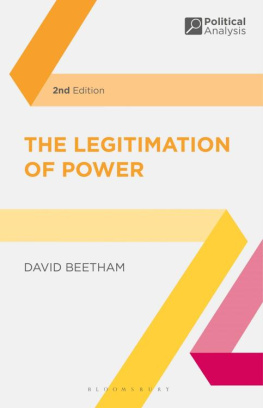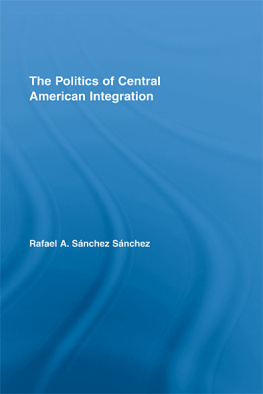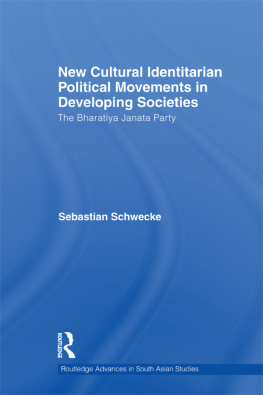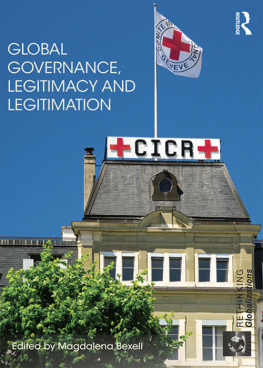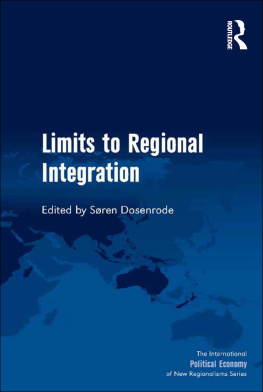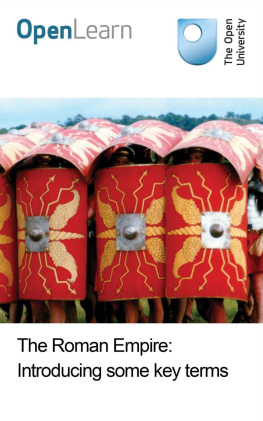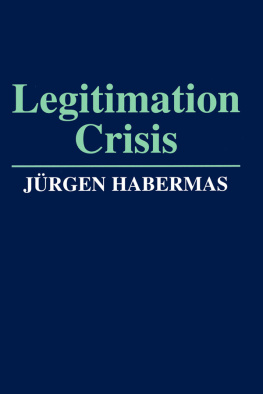
LEGITIMATION AND INTEGRATION IN DEVELOPING SOCIETIES
Westview Replica Editions
The concept of Westview Replica Editions is a response to the continuing crisis in academic and informational publishing. Library budgets for books have been severely curtailed. Ever larger portions of general library budgets are being diverted from the purchase of books and used for data banks, computers, micromedia, and other methods of information retrieval. Interlibrary loan structures further reduce the edition sizes required to satisfy the needs of the scholarly community. Economic pressures (particularly inflation and high interest rates) on the university presses and the few private scholarly publishing companies have severely limited the capacity of the industry to properly serve the academic and research communities. As a result, many manuscripts dealing with important subjects, often representing the highest level of scholarship, are no longer economically viable publishing projectsor, if accepted for publication, are typically subject to lead times ranging from one to three years.
Westview Replica Editions are our practical solution to the problem. We accept a manuscript in camera-ready form, typed according to our specifications, and move it immediately into the production process. As always, the selection criteria include the importance of the subject, the work's contribution to scholarship, and its insight, originality of thought, and excellence of exposition. The responsibility for editing and proofreading lies with the author or sponsoring institution. We prepare chapter headings and display pages, file for copyright, and obtain Library of Congress Cataloging in Publication Data. A detailed manual contains simple instructions for preparing the final typescript, and our editorial staff is always available to answer questions.
The end result is a book printed on acid-free paper and bound in sturdy library-quality soft covers. We manufacture these books ourselves using equipment that does not require a lengthy make-ready process and that allows us to publish first editions of 300 to 600 copies and to reprint even smaller quantities as needed. Thus, we can produce Replica Editions quickly and can keep even very specialized books in print as long as there is a demand for them.
About the Book and Author
Legitimation and Integration in Developing Societies: The Case of India
Reuven Kahane
Though characterized by great human diversity and subject to economic constraintstypically disintegrative forcesIndian society has managed to function in a democratic manner through institutionalization of conflict among the myriad of competing ethnic, religious, and political factions. The author of this book maintains that the relative unity of Indian society can be explained by its unique pattern of integration, which allows conflicting forces to cooperate through mediatory institutions. Such institutions, he argues, link differing codes of behavior and equalize opposing groups, creating structures that serve as bridging mechanisms within the society. Dr. Kahane goes beyond the example of India, pointing to general theoretical considerations important for the analysis of political legitimation and integration in diverse societies. He suggests a model of society in which conflicts are accentuated for integrative purposes, illustrates the structure of the mechanisms by which antagonistic elements of society are connected, and stresses that analysis of the patterns in which social units (political, cultural, and religious) are linked is often the most efficient means of explaining the nature of a given social order.
Dr. Kahane is senior lecturer in the Department of Sociology and Social Anthropology at the Hebrew University of Jerusalem, and is a research scholar in the Modernization and Comparative Civilizations Unit at the University's Harry S. Truman Research Institute.
Legitimation and Integration in Developing Societies
The Case of India
Reuven Kahane
The author would like to thank Harry S. Truman Research Institute for the Advancement of Peace, Hebrew University of Jerusalem, for their support in the publication of this book.
First published 1982 by Westview Press, Inc.
Published 2018 by Routledge
52 Vanderbilt Avenue, New York, NY 10017
2 Park Square, Milton Park, Abingdon, Oxon OX14 4RN
Routledge is an imprint of the Taylor & Francis Group, an informa business
Copyright 1982 Taylor & Francis
All rights reserved. No part of this book may be reprinted or reproduced or utilised in any form or by any electronic, mechanical, or other means, now known or hereafter invented, including photocopying and recording, or in any information storage or retrieval system, without permission in writing from the publishers.
Notice:
Product or corporate names may be trademarks or registered trademarks, and are used only for identification and explanation without intent to infringe.
Library of Congress Catalog Card Number 82-51017
ISBN 13: 978-0-367-02014-9 (hbk)
Tables
In most Third World countries the emergence of nationhood has been accompanied by the rise of universalistic, egalitarian expectations. This process in turn has accentuated primordial and class conflicts (Geertz 1963), most of which have arisen from antagonism involving different ethnic or religious sentiments, values, and interests. These conflicts have posed a threat to the integrative existence of many Third World societies (Eisenstadt 1973; Smelser 1968), which has often been aggravated by their exploitation by major international powers and wealthy countries and their dependence on international markets (Amin 1977). Under such conditions many governments of developing societies have become regimented and are usually dominated by the military. While a regimented government may appear to unify a given society in the short run, it often lacks legitimacy and is too rigid to absorb all the divisive forces in the society.
Against the background of a strong potential for disintegration, due to acute primordial diversity and economic scarcity, the capacity of Indian society to function in a democratic manner and to institutionalize conflicts presents a "deviant" case among developing nations. Most countries with similar conditions have succumbed to a process of power struggles, total conflict, and social anomie, which has often resulted in civil war, governmental instability, or military rule, India, by contrast, has been relatively successful in maintaining political integration within a competitive framework. Taking this fact into account (in spite of the 1975 State of Emergency which was reversed by the March 1977 and January 1980 elections), it seems that India provides an excellent case for studying how conflicting patterns of legitimation and integration can coexist.
One school of thought predicts that India's diversity will ultimately lead to disintegration unless it shifts to an authoritarian regime (Harrison 1960; Moore 1966). Another insists that it has succeeded in countering centrifugal trends through the development of democratic institutions (Kothari 1970). Neither school, however, specifies the makeup of the socio-political institutions which would increase the probability that one form of regime evolves to the exclusion of the other. It is our thesis that Indian society has managed to sustain its unique democratic system by building institutions which accentuate the inherent conflicts, on the one hand, and yet mediate between antagonistic groups and sectors, on the other.


